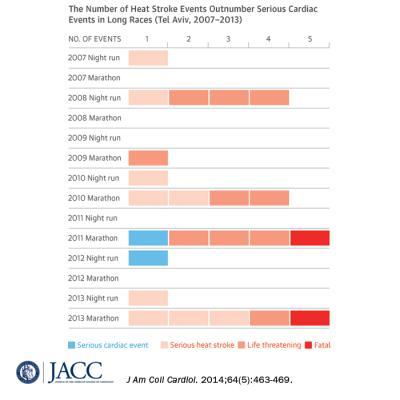Since emerging from the primordial ooze, organic life has been doing unnatural things in defiance of nature. Nothing is as unnatural as endurance running but sentient beings like to push boundaries.
Endurance running is impressive, but it is risky. There are calls for pre-participation electrocardiogram (ECG) screenings because of an alarming number of sudden death occurrences in athletes. including undetected heart disease in a young and seemingly healthy people, but it turns out heart attack is not the greatest health risk for runners, as is commonly believed.
Instead, heat stroke is 10 times more likely than cardiac events to be life-threatening for runners during endurance races in warm climates, according to a paper in the Journal of the American College of Cardiology.
Due to the increasing popularity of races over 10 km (6.2 miles), or endurance races, researchers sought to determine how many life-threatening events during endurance races were caused by heat stroke compared to cardiac events. A life-threatening event was defined as an event requiring mechanical ventilation and hospitalization in an intensive care unit.

In long races, heat stroke is more dangerous than heart attacks. Credit: Journal of the American College of Cardiology
Researchers reviewed data on all deaths and urgent hospitalizations at 14 popular long-distance races in Tel Aviv from March 2007 to November 2013. Overall, 137,580 runners were studied. Only two serious cardiac events were reported during the time period and none were fatal or life threatening. In contrast, over the same period, there were 21 serious cases of heat stroke, including two that were fatal and 12 that were life-threatening.
Under Israeli sports law, ECG screening is required for participants who are organized in teams or associations, but not for individuals in public endurance races. Runners were only required to submit a personal statement confirming a state of good health. Researchers, therefore, asked 513 runners who were surveyed at the 2013 race whether they had undergone an ECG screening.
Only 35 percent reported an ECG in the previous year and 46 percent said they had an ECG in the previous five years, reducing the possibility that the low number of cardiac events stemmed from at-risk runners being screened out before the race.
"This research shows that heat stroke is a real threat to marathon and long-distance runners; however, there are no clinical studies of potential strategies to prevent heat stroke during these types of events," said Sami Viskin, MD, senior author of the study and a cardiologist at Tel Aviv Medical Center. "It's important that clinicians educate runners on the ways to minimize their risk of heat stroke, including allowing 10-14 days to adjust to a warm climate, discouraging running if a person is ill or was recently ill because a pre-existing fever impairs the body's ability to dissipate additional heat stress, and developing better methods of monitoring body core temperature during physical activity."





Comments